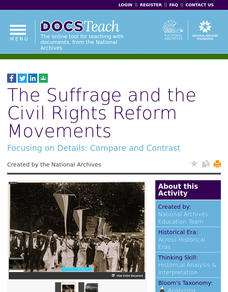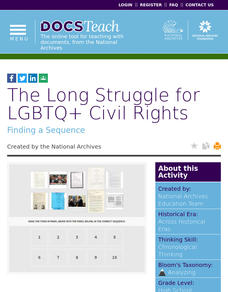Stanford University
Civil Rights or Human Rights?
Young citizens consider the American civil rights movement as part of the global struggle for human rights. After using a timeline activity to learn about the major events in the civil rights movement, class members study...
Curated OER
The Movement Before the Movement: Civil Rights Activism in the 1940s
Many educators focus on the civil rights movement as it occurred after Rosa Parks incited the bus boycott. Extend the understanding of the fight for civil rights in the United States with this post-WWII instructional activity. Learners...
Facing History and Ourselves
Civil Rights Historical Investigations
The murder of Emmett Till, the Selma to Montgomery march, and the desegregation of Boston schools are the focus of three units that ask class members to investigate why these events were so key in the struggle for civil rights....
Civil Rights 50
Civil Rights at 50
The 50th anniversary of the 1963 March on Washington, President Johnson's signing of the Civil Rights Act of 1964, the Voting Rights Act of 1965, and the Immigration and Nationality Act of 1965 provide the backdrop for a series of lesson...
iCivics
The Road to Civil Rights
Here is a fantastic resource on the civil rights movement! It includes reading materials and worksheets, and particularly highlights major legislation and the role of the judicial branch in the federal government in addressing the...
BrainPOP
Civil Rights Lesson Plan: Tracking History Through Timelines
Use the accompanying assessment to determine your class's prior knowledge on Martin Luther King, Jr. before beginning a lesson on the famous civil rights movement leader. The resource has young historians thinking about life for African...
DocsTeach
The Civil Rights Act of 1964 and the Equal Employment Opportunity Commission
1964: A victory for the civil rights movement! Scholars read a section of the Civil Rights Act of 1964 and discuss what affirmative actions means to them. The resource is a jigsaw activity, with each group focusing on one section of the...
K20 LEARN
Civil Rights for All: Civil Rights Movement
The Civil Rights Movement was only the beginning. Using images and a series of queries, learners consider current fights for equality. After viewing video clips profiling the women's rights movement, the American Indian Movement, and...
DocsTeach
The Suffrage and the Civil Rights Reform Movements
It's the American way to put one foot in front of the other and march. Using images of protests from the civil rights and women's suffrage movements, young historians analyze similarities between the two watershed moments of social...
DocsTeach
African American Soldiers and Civil Rights During WWI
Young scholars analyze primary source documents and images to determine how African American soldiers were denied their civil rights during World War I.
PBS
Making Change: Revolutionary Tactics of the Civil Rights Movement
The film American Revolutionary: The Evolution of Grace Lee Boggs introduces viewers to the differing philosophies of and strategies employed by 1960s civil rights leaders such as Malcolm X and Martin Luther King, Jr. and the debate over...
Curated OER
Voices from Little Rock: Understanding the Civil Rights Movement through Primary Sources
As part of a study of the Civil Rights Movement, class members examine documents associated with the Little Rock Nine, the Brown v. Board of Education ruling, the 14th and 15th Amendments to the US Constitution, and chapters from Melba...
DocsTeach
The Long Struggle for LGBTQ+ Civil Rights
Academics analyze 10 primary documents and photos to create a timeline of the LQBTQ+ movement. The activity includes an online worksheet. Scholars also participate in a group discussion to understand the long struggle the LGBTQ+...
DocsTeach
Civil Rights or Freedom? When Vietnam and the Civil Rights Movement Clashed
When Martin Luther King Jr. took a stand against the Vietnam War, interests collided. With a letter from Jackie Robinson to Lyndon B. Johnson, the baseball legend urges the president to remain firm in his resolve for civil rights. Young...
National Endowment for the Humanities
The Freedom Riders and the Popular Music of the Civil Rights Movement
The Civil Rights Movement of the 1960s marched to its own beat—literally. Using songs from the era, as well as other primary sources such as King's "I Have a Dream" speech, class members analyze lyrics to discover how music and protest...
Alabama Department of Archives and History
Women of the Movement: Civil Rights Movement in Alabama
Many know of Rosa Parks involvement in the Civil Rights Movement, but who were other female leaders? The lesson focuses on female Civil Rights leaders and their achievements. Scholars complete research, participate in group discussions,...
US National Archives
Documented Rights Educational Lesson Plan
How have groups struggled to have their unalienable rights recognized in the United States? Acting as a research team for the Human Rights Council of the United Nations, your young historians will break into groups to research...
PBS
Muhammad Ali: Boxer and Civil Rights Activist
Many young people today know Muhammad Ali as the aging boxer who lit the torch at the 1996 Olympics. Introduce young historians to Ali the boxer, the Civil Rights activist, the war protestor, and the humanitarian with a powerful lesson...
PBS
Malcolm X: Minister and Civil Rights Activist
Any study of the leaders of the Civil Rights Movement would be incomplete without an examination of the life of Malcolm X. Class members view a short biographical video and analyze primary source documents to gain an understanding of the...
Judicial Learning Center
The Bill of Rights and Civil Liberties
Why is the Bill of Rights so important to American's civil liberties? An important resource helps scholars find these answers and more by reading through state and federal constitutions to discover their own civil liberties. The activity...
Newseum
'The Press and the Civil Rights Movement' Video Lesson
Scholars watch a video featuring journalists who covered the civil rights movement, then respond to questions on a viewing guide. The video features interviews with participants and original news footage from the 1950s and 1960s. In...
Newseum
Civil Rights: Chronicling the Movement
Scholars investigate events in the civil rights era in their community and develop a multimedia presentation of their findings. They compare local events with national events discussed on a NewseumED timeline.
Newseum
Civil Rights News Coverage: Looking Back at Bias
Not all southern newspapers covered the civil rights movement of the 1950s and 1960s. Young journalists investigate how The Lexington (Ky. Herald-Leader and The Jackson (Tenn.) Sun re-examined their coverage of the movement. After...
Newseum
Civil Rights: Knowns and Unknowns
Class members generate a list of research questions to review the civil rights movement and determine what scholars still need to learn. Groups then select a different compelling question, create a hypothesis and find evidence to support...























